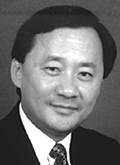The mission of the Computer Society is to advance the theory, practice, and application of computer and information processing science and technology. To achieve this mission and to better serve our members, we must address the rapid growth of the computer industry. Moreover, we must be responsive to the diverse needs of its worldwide membership and the computing profession. If elected, I will emphasize the following items:
- Guide the Computer Society to make it a learning community by facilitating the rapid dissemination and sharing of knowledge, through journals, conferences, and seminars. This helps our members to overcome obsolescence with rapidly changing computer and communication technologies. Computer Society should provide education through local chapters and interactive learning through the Internet. Our journals should consolidate to provide timely technical reviews, surveys, and tutorials.
- Promote publications, conferences, and services such that our current and targeted members can stay attuned to changing technology and continuously expand their technical expertise. Because many members are practitioners, we must develop new publications and services, and improve our current offerings to serve their needs. Accordingly, I will work with society volunteers on different program boards to develop strategic directions to help bridge the gap from theory to practice. This will go a long way in helping members keep up with new technologies.
- Develop publications and services to serve both regular and student membership worldwide. With rapid growth in technologies in Pacific Rim and East European countries, large international markets increasingly in need of new technologies are waiting to be tapped. I plan to work with volunteers to develop effective and economic ways to deliver workshops, conferences, publications, digital libraries, and membership services to these regions. The Computer Society must utilize such opportunities to increase its global presence and impact, and bring all society members to closer collaboration.
I will achieve these goals through increased (regular and student) membership, reduced dues, and cost reduction. I will be honored to serve you as first vice president and lead the Computer Society into the next century. Please vote.
Biography
Wah has actively served the Computer Society since 1985. Currently the second vice president of publications, he defines the scope of its 18 journals and magazines to provide readers with up-to-date information for training, learning, and research. Within the first six months of his tenure, he has led the selection of 12 high-quality editors-in-chiefs for its journals.
An IEEE fellow, Wah served previously as treasurer, chair of the Fellow Evaluation Committee, AdComm member of the IEEE Neural Network Council, and member of the Board of Governors (1996-1997; 1989-1993). Earlier, he was the editor-in-chief of IEEE Transactions on Knowledge and Data Engineering, which he co-founded in 1988. He also served on the IEEE-CS Publications Board and Press Activities Board. Wah chaired 18 conferences (11 with IEEE-CS), and served as guest editor for 10 special issues (seven with IEEE-CS).
Wah is the Robert T. Chien Distinguished Professor of Engineering and a professor of electrical and computer engineering at the University of Illinois, Urbana-Champaign. Previously, he was with Purdue University and the National Science Foundation. He held the Fujitsu Visiting Chair Professorship at the University of Tokyo, Japan (1992), and the McKay Visiting Professorship at the University of California, Berkeley (1994). He has published more than 220 articles and has written or edited five books. He received the IEEE-CS Technical Achievement Award in 1997. Wah received BSEE and MSEE degrees from Columbia University, and MS and PhD degrees in computer science from the University of California, Berkeley.
